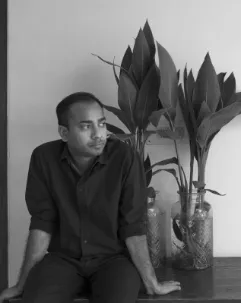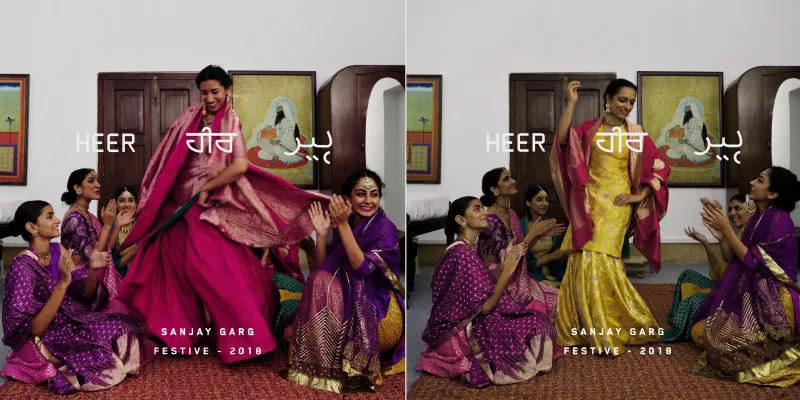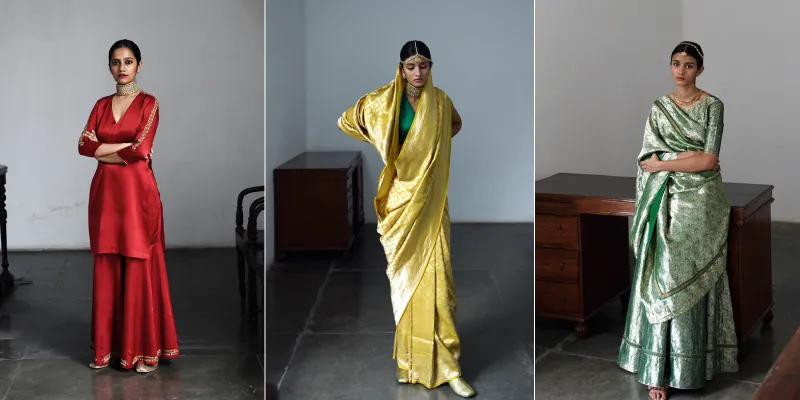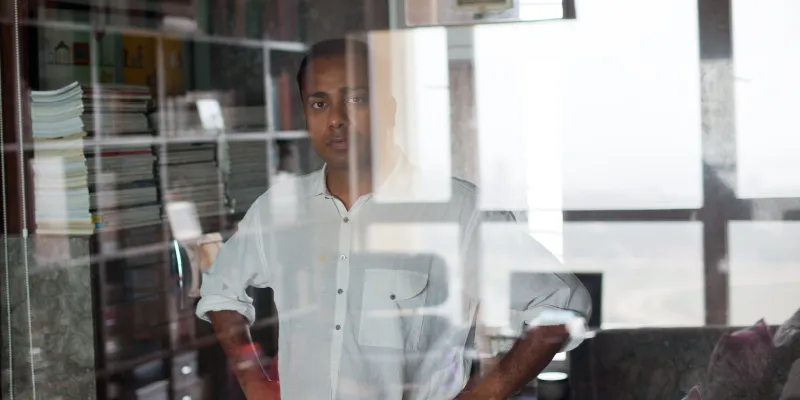How Sanjay Garg’s quest to be a collector of experiences, art and culture reflects in his label, Raw Mango
With a unique take on marrying traditional and contemporary designs, Sanjay digs deep and channels his passion for art, travel and photography in business too.
It has been a long way from Sanjay Garg’s home in Mubarikpur, a village in Rajasthan’s Alwar district, to the heart of NCR, but it is a story that he loves to tell, and with pride too. In the last decade, Sanjay has worked tirelessly towards the revival of handloom textiles, be it Chanderi fabric from Madhya Pradesh, Benarasi brocades from Varanasi, Jamdani and muls from West Bengal, and Mashru from Gujarat. Tackling the declining patronage of handwoven textiles, his company, Raw Mango, has successfully contemporised sarees and lehengas for women of all ages – bringing the uniqueness of Indian designs and the rich legacy of their vibrant colours to the forefront.

Sanjay Garg
He is passionate about everything he undertakes. So, whether it is a jet black granite prism that he picks up as a collector on his travels to a Chanderi sari, woven in shades of golden mandarin that he designs for a season, each pursuit is a reflection of his thoughts, his ideas and beliefs. From his love for folk music to his fondness for simple, homespun recipes to his life work of re-looking traditional textiles, each pursuit has taken Sanjay on a path of cultural history that has enriched his world.
A brand new collection

The Heer collection
Raw Mango’s new collection, named Heer, is a tribute to Punjab. “My appreciation for the culture of Punjab and my Sikh sister-in-law is where I drew my inspiration,” he says. “It is dedicated to undivided Punjab.” The collection comprises rich brocade sarees, knee-length silk kurtas, floor-grazing organza and brocade shararas, lehengas with traditional motifs and silk-satin odhanis among many other fine pieces.
Ever since Sanjay launched Raw Mango in 2008, he developed a cult following across India. His Delhi-based brand was a big hit with its minimalist touches and commitment to the purity of the crafts. His sarees are worn by Bollywood celebrities and political personalities alike, and is much loved by those who love traditional, handcrafted ensembles.
Designer with an art
Today, Raw Mango employs over 250 skilled karigars. But Sanjay’s designs are more than just about fashion; they are about the larger picture of uplifting an entire community of karigars and creating a new value for the saree. He has adapted traditional techniques to transform them into sophisticated, contemporary designs, thereby creating a fresh, new aesthetic that is both home-grown and chic.

Raw Mango is known for its beautiful designs
In addition to the flagship store in Chhatarpur, Delhi, the brand has also launched in Mumbai and Bengaluru. Besides his work, Sanjay continues to engage in academia and actively participates in the design and craft community. This includes addressing conferences at NIFT and the Ministry of Textiles show in Gandhinagar.
His pieces have been internationally exhibited at the Victoria and Albert Museum, where a set of his Chanderi sarees are part of the permanent collection and in London and at the Museum of Modern Art in New York.
He also holds trunk shows in Hong Kong, London and Singapore, and is looking to facilitate further international outreach.
Weekend pursuits
When it comes to what he enjoys doing over his weekends, Sanjay says he enjoys collecting antiques, photography, gardening, music and cooking.
Like a true collector, he makes sure he picks up beautiful objects wherever he goes. Whether he is travelling from Cochin to Udaipur, from Delhi to Ahmedabad, to Bali, Portugal or Japan—he makes it a point to visit the flea markets and antique markets in these regions. “I am attracted by the visual impact of an object and its rarity. My work inspires me to collect these antiques and vice versa,” he says.
As for photography, which is his other passion, he says he enjoys this hobby immensely. “In Raw Mango, I have tried to stay away from fashion imagery,” Sanjay explains. “We try to create images with a backstory to them. An image complements the collection, not by showcasing certain products, but by showcasing the environment or the culture behind the collection.”
“All my hobbies, from textiles, photography, music and collecting rare objects – are an extension of my brand.”
For the love of culture

Sanjay is passionate about photography
Sanjay’s love for photography began when he was in his 20s. “I was in NIFT when I realised that I could use photography in my work,” he remembers.
“It was a wonderful way of communication. I realised that whether I wanted to convey anger or happiness I could do so through photography.”
Sanjay is also interested in folk music of the world. “I grew up with folk songs and these songs helped me understand the culture of my region. Of late, I have developed a taste for Mexican music.”
Sanjay enjoys cooking too. “But I don’t do the Maharaja style of cooking; I like the village style of cooking that is very simple and with very little fuss. I like cooking both Indian and Italian food,” he quips.
The story of revival
“I would say ‘colour’ is a part of my story,” Sanjay says about his fabrics that are full of beautiful colours, shades and textures. He has a refreshing take on marrying traditional and contemporary styles.
“I am a textile designer and I like to work with heritage textiles. I don’t like to use a word like ‘revival’ or ‘revivalist’, because ‘revival’ would mean that something has died. I like to “revive the interest” in things by making some changes. I am a traditionalist but I do not agree with everything that is in tradition. If there are problems I fix the problems and see how I can take it to the next generation. I would like it fix things and pass it on.”
The Delhi-based designer loves travelling too, especially to countries like Sri Lanka and Japan. There are no conventional displays in most of his stores. He keeps the textiles in closets to protect them from dust and humidity.
“I believe that it is important to grow as a person and acquire knowledge,” adds Sanjay. “As you do so, you become a better person. You learn to invest in yourself and in turn, you understand the world.”







